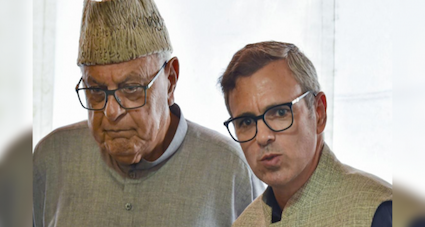For a couple of years in the recent past, Omar Abdullah has remained in the shadows of his father, Dr Farooq Abdullah, the patriarch of the National Conference (NC). Farooq has been doing most of the talking, if not all, on behalf of the NC. Not any longer though for the steps Omar took on Wednesday mean the future of the party has been decided by him, and those close to him. No, that does not mean that he has rebelled against his father. Just that the father-son duo are playing their cards well and moving forward, shaking off Mehbooba Mufti from their coat-tails.
The less than skin deep bonhomie of the NC with People’s Democratic Party (PDP) is going to be over soon. It will also spell the beginning of the end of People’s Alliance for Gupkar Alliance (PAGD), an alliance of NC, PDP, CPM, Awami National Conference (AWC) and a couple of other inconsequential parties. Initially, even People’s Conference (PC) of Sajjad Gani Lone joined PAGD but his disillusion was swift and he parted ways thereafter.
On Monday, the senior Abdullah had convened an all-party meeting in Srinagar where all PAGD constituents, a few leaders of the Shiv Sena and even the Congress participated. To discuss the weighty issue of “special electoral roll revisions’’ in the Union Territory of Jammu and Kashmir. Pious intentions of all “fighting together’’ were expressed, and it was surprising as the Congress was not a part of the PAGD.
On Wednesday, less than 48 hours later, the provincial committee meeting of the NC, convened by Omar, unhinged everything that had happened on Monday at all-party meeting. “Provincial committee members have unanimously resolved that National Conference (NC) should prepare and fight all 90 legislative assembly seats,’’ the party said in a statement released after the meeting.
“The participants present in the meeting expressed dismay over the recent statements of some constituents of the PAGD targeting NC. They said that it does not contribute to the overall unity of the amalgam. They also denounced the unfair treatment meted out to NC at the PAGD,’’ the statement added.
Officially, son Omar, vice president of the NC, will now approach the father, Dr Farooq, president of the party, and provide this stance decided by the provincial committee to him! For good measure, NC spokesman Tanvir Sadiq pointed to some statements made by second, or third tier PDP leaders against the NC at Kupwara and elsewhere. To avoid the tag of knee jerk reaction, PDP said in its reaction that fighting the elections alone was not to impact the unity of “larger goal’’.
“PAGD was conceived for a much larger goal than just an electoral alliance. If some constituent of the Alliance has reservations of some kind of electoral alliance, that will not impact our unity for the larger goal,’’ the PDP tweeted.
Yusuf Tarigami, CPM leader and spokesperson of the PAGD, said the constituents were together to fight for the “rights of the people of J&K’’. Incidentally, PAGD was formed a couple of years ago to fight for the restoration of Article 35-A which gave special status to J&K. When it was pointed out to him that NC was alleging “unfair treatment’’, Tarigami responded that the PAGD was headed by their president!
Omar Abdullah’s assertion kind of reflects how the offshoots of dynasties are coming on to their own: Aditya Thackeray and Tejashwi Yadav now; Akhilesh Yadav and Rahul Gandhi for a considerable time now.
With the NC deciding to go it alone during assembly elections, as and when they are held, disintegration of the PAGD seems like a foregone conclusion. Leaders of various constituent parties are likely to take more strident postures publicly against one another, thereby hastening the process of disintegration further.
From 1983 assembly elections onwards, J&K has been ruled by different coalitions but it was only once, in 1987, that a pre-poll alliance of the NC and Congress was formed. On all other occasions, varied post-poll alliances emerged to rule the state, a UT now. The parties which became alliance partners after the elections had fought against one another, often bitterly. But the glue of power was good enough to bring them together.
This time too, as and when the assembly elections are held in J&K, the chances of formation of a powerful pre-poll alliance are slim. Those who would have fought one another are the ones who will join hands to form the government later. That is the most likely scenario emerging and don’t be surprised if a NC-BJP combine becomes the ruling coalition this time!
Electoral History of J&K at a glance
1983: National Conference won majority as a single party.
1984: G M Shah rebelled against Farooq Abdullah. Formed a coalition government with the Congress.
1987: Pre-poll alliance of NC and the Congress. Coalition government.
1996: No pre-poll alliance. NC clear winner. Single party rule.
2002: No pre-poll alliance. An alliance of PDP-Congress was formed after elections. Coalition government.
2008: No pre-poll alliance. An alliance of NC-Congress was formed after elections. Coalition government.
2014: No pre-poll alliance. An alliance of PDP-BJP was formed after elections. Coalition government.
Next elections: It is not clear when these will be held. However, no pre-poll alliance is likely. Many post-poll alliances can shape up. Alliances of a. NC-BJP, b. NC-BJP-PC, c. Congress-PDP possible. Aam Aadmi Party (AAP) can emerge as a major player. Mainly a spoiler for the Congress, as also the BJP, in many assembly segments, particularly in the Jammu region.
(Sant began as a teacher but after six years, joined the Indian Express, Chandigarh in 1990, the year when terrorism was taking its first step in J & K and soon there would be exodus of lakhs of Kashmiri Pandits from the Valley. He subsequently worked for The Statesman, The Times of India and Star News among others. He is based in Jammu since May 2000. He edits epaper.earthnews.in, a newspaper from Jammu presently.)


